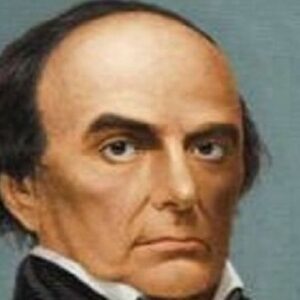Daniel Webster was a well-known American politician and senator. In a public address, he fiercely criticized the War of 1812 and the violation of New England’s shipping rights, and he was known for his gift of gab. Furthermore, this address served as a protest against the fanaticism of New Englanders who advocated for the region’s independence from the Union. He openly criticized President James Madison’s administrative and wartime actions as a member of the House of Representatives. He opposed the ‘tariff of 1816’ and the ‘American System,’ an economic scheme proposed by House Speaker Henry Clay. John Marshall, the fourth Chief Justice of the United States, made various court rulings based on his briefs. Aside from that, he also provided constitutional law interpretation to a number of justices. As a result of these actions, he was dubbed the “Great Expounder of the Constitution.” He was a strong advocate of the “Jury nullification” statute during his time as Secretary of State, as he indicated in his famous “Seventh of March” address. As the leading American diplomat, Webster defended America’s authority to intervene in Hungary’s internal politics in the Hulsemann Letter. He was an outspoken promoter of the notion of establishing commercial ties with Japan.
Childhood and Adolescence
Daniel Webster was born in Salisbury, New Hampshire, to Ebenezer and Abigail Webster. He grew up with his nine siblings. His father worked as a farmer and ran a bar during the American Revolution.
He attended Phillips Exeter Academy, a prep school in Exeter, New Hampshire, in 1794. He went on to Dartmouth College, where he gained notoriety for his oratory skills.
He studied law and worked as an apprentice to Thomas W. Thompson in Salisbury after graduating from Dartmouth in 1801. He quit from the law firm after only a few months and spent a year as the headmaster of the Fryebug Academy in Maine.
A Career of Daniel Webster
In 1804, he got a position as an associate counsel with Boston’s famed attorney Christopher Gore. It was during this time that he became familiar with a variety of legal and political issues, as well as a number of New England lawmakers.
He was admitted to the bar in 1805. He intended to open a practice in Boscawen after he returned to New Hampshire. It was during this time that he began to take an interest in politics.
He passed over his practice to his brother Ezekiel in 1806, and the following year he moved to Portsmouth to begin practicing law. His public address at the Washington Benevolent Society in 1812, in which he expressed his opposition to the War of 1812, was a watershed moment in his career.
He was chosen to the Rockingham Convention as a result of his speech, which gained him widespread acclaim. He was a member of the assembly’s writing committee and wrote the “Rockingham Memorial.”
In 1812, he was elected to the House of Representatives for his contributions to New England Federalism, maritime interests, and continuous opposition to war. He stayed in this position until 1817.
He eventually relocated his practice to Boston. He was a delegate to the 1820 Massachusetts Constitutional Convention because of his widespread reputation as a constitutional lawyer. During the Convention, he spoke out against men’s universal suffrage and in favor of the State Senate being divided into districts.
In 1832, he spoke out against Andrew Jackson’s economic policies. One of these measures was Jackson’s struggle against the Second Bank of the United States (1816–1841).
As one of the four Whig Party members, he was instrumental in the administration of the White House in 1836. Later, when the Party nominated William Henry Harrison as president, he turned down the offer of vice presidency.
He served as Secretary of State in 1841. He was a key figure in the creation of the Webster-Ashburton Treaty, which ended the Caroline Affair the following year.
Under the pressure of the Whig Party, he resigned from the ministry in May 1843.
After being elected to the Senate for the second time in 1845, he vigorously opposed the annexation of Texas and the Mexican-American War.
He gave his famous “Seventh of March” address on the 1850 Compromise on March 7, 1850. As a result, abolitionists in New England were harshly critical of him.
He resigned from the Senate in 1850 to take up the position of Secretary of State under Whig President Millard Fillmore. In this sense, his tireless advocacy for the Fugitive Slave Law is particularly noteworthy. In 1852, he ran for President for the last time.
Personal History and Legacy
He married Grace Fletcher in 1808 and they had four children. During the Civil War, his son Fletcher Webster served as a Union Amy infantry colonel.
He was critically hurt when he fell off his horse at his Marshfield house. He was suffering from liver cirrhosis at the time, which caused a cerebral bleed, and he died as a result.
Estimated Net Worth
Daniel Webster is one of the wealthiest politicians and one of the most well-known. Daniel Webster’s net worth is estimated to be $1.5 million, according to Wikipedia, Forbes, and Business Insider.
Trivia
This powerful politician fell into a personal debt during the Panic of 1837, from which he never recovered. His position deteriorated as a result of his expensive lifestyle, drunkenness, and gambling addiction.


